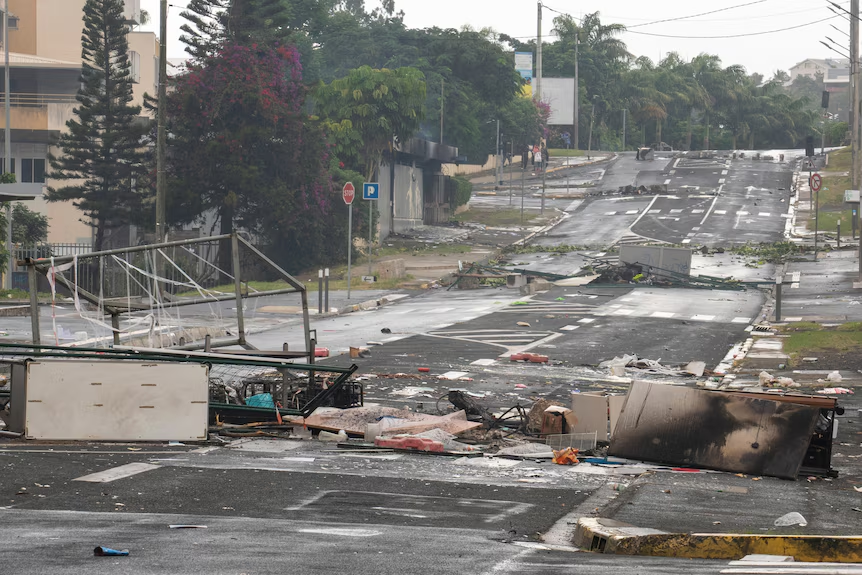A gendarme was killed on Thursday in France’s riot-struck Pacific territory of New Caledonia by an “accidental gunshot”, Interior Minister Gérald Darmanin told AFP.
“It was not a hostile shot” that killed the officer, added a source informed about the incident, which brings to five the number of deaths in unrest since Monday, including two gendarmes.
The unrest flared after lawmakers in Paris approved a bill extending voting rights in New Caledonia’s provincial elections to residents arriving from mainland France – a change critics fear could marginalise Indigenous people and benefit pro-France politicians.
The National Assembly (lower house) adopted the reform shortly after midnight early on Wednesday.
France promised to grant more autonomy to the Pacific island territory in the Noumea Accord of 1998. New Caledonia’s voter lists have not been updated since, which has excluded any residents who arrived from mainland France (or elsewhere) over the past 25 years from voting in provincial polls.
Locals fear that expanding voter lists would benefit pro-France politicians and reduce the weight of the Kanaks.
In three municipalities on the French-ruled island, gendarmes faced about 5,000 rioters, including between 3,000 and 4,000 in the capital Noumea, France’s High Commissioner Louis Le Franc said in a televised press conference.
Two hundred people have been arrested, and 64 gendarmes and police injured, while road barricades put up by the protesters were causing a “dire situation” for medicine and food for the population, he added.
France declared a state of emergency in New Caledonia that came in force at 5 am Wednesday, giving authorities additional powers to ban gatherings and forbid people from moving around the island.
Police reinforcements adding 500 officers to the 1,800 usually present on the island, have been sent after rioters torched vehicles and businesses and looted stores.
Noumea resident Yoan Fleurot said in a Zoom interview that he has seen looting and destruction of properties. Some storeowners willingly let their shelves be raided, pleading that their shops not be destroyed, he said.
Fleurot said he is armed with a 16-caliber gun and has video surveillance installed around his house, adding he has only ventured out in daylight to check on his parents or his properties.
The roadblocks were difficult to pass through, and he been subjected to insults and threats of violence, he said. “I am New Caledonian, but I no longer know my country anymore,” he said.
“Caledonia will have a hard time recovering from this crisis… Everything, 80 percent, is destroyed,” he added.
Main and secondary roads in Noumea were blocked by barricades with burning cars and car carcasses, some with booby traps with gas bottles and ignition systems, French official Le Franc said.
“I am calling on those at the head of the CCAT to stop these actions, which are murderous, deadly actions that can leave families in mourning,” he said, referring to the Field Action Co-ordination Cell (CCAT), which organised the protests that began on Monday.
He said CCAT was “”an organisation of thugs which engages in acts of violence”, and differentiated it from the main pro-independence party, FLNKS, and other pro-independence political groups.
FLNKS has condemned the violence and called for dialogue to resolve the situation.
There were also confrontations overnight between active members of CCAT and self-defence groups or militias which were formed to protect themselves, he said, adding the militia are also in breach of the curfew and the ban on carrying weapons.
Rioting broke out over a new bill, adopted by lawmakers in Paris on Tuesday, that will let French residents who have lived in New Caledonia for 10 years vote in provincial elections – a move some local leaders fear will dilute the indigenous Kanak vote.
Three young Kanak have died in the riots, and a 24-year-old police official died from a gunshot wound.
A state of emergency will last for 12 days and authorities have also banned video app TikTok.
Electoral reform is the latest flashpoint in a decades-long tussle over France’s role in the mineral-rich island, which lies in the southwest Pacific.













